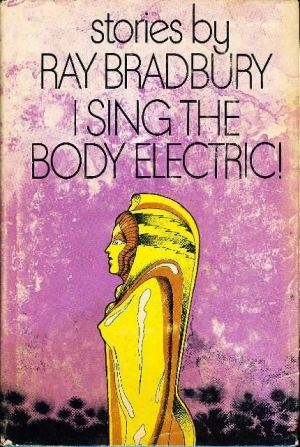Birthday Reviews: Ray Bradbury’s “Downwind from Gettysburg”

Ray Bradbury was born on August 22, 1920 and died on June 5, 2012.
Bradbury never received the Hugo Award, although he received four Retro Hugo Awards for his novel Fahrenheit 451, his fanzine Futuria Fantasia, and twice for Best Fan Writer. He was nominated for a single Hugo. He was never nominated for a Nebula Award. He won the Bram Stoker Award for his collection One More for the Road. Fahrenheit 451 also won a Prometheus Award and a Geffen Award. Bradbury won three Seiun Awards for Best Foreign Short Story. He won the coveted Balrog Award for Poetry in 1979. In 1966, he was awarded a Forry Award by LASFS. He received a World Fantasy Lifetime Achievement Award in 1977 and was named a Grand Master of Fantasy with a Gandalf Award in 1980, the final year the award was in existence. Bradbury was the Guest of Honor at ConFederation, the 44th Worldcon, held in Atlanta in 1986. He received a Lifetime Achievement Award from the Bram Stoker Awards in 1989, the same year he was named a Grand Master by SFWA. World Horror Con named him a Grandmaster in 2001 and the Rhysling Awards did so in 2008. He was given an Eaton Award for Lifetime Achievement in 2008. Bradbury was inducted into the Science Fiction Hall of Fame in 1999 and the First Fandom Hall of Fame in 2012.
“Downwind from Gettysburg” was originally published in Bradbury’s collection I Sing the Body Electric in 1969 and was reprinted in 2003 in Bradbury Stories: 100 of His Most Celebrated Tales. When the latter was reprinted in two volumes, the story appeared in Ray Bradbury Stories Volume 2. Although it hasn’t often been reprinted in English, the story has been translated, usually as part of I Sing the Body Electric, into French, Portuguese, German, and Italian.
In 1964, Walt Disney created an animatronic version of Abraham Lincoln to appear at the Illinois Pavilion at the New York World’s Fair. The following year the exhibit moved to Disneyland, where the Lincoln show continued to run, on and off through the present, although another version, featuring versions of all the Presidents, runs at the Magic Kingdom in Florida. In 1969 Ray Bradbury published “Downwind from Gettysburg,” which featured a similar animatronic version of Abraham Lincoln.
Bradbury’s version, however, sits in a replica of Ford’s Theatre and the story opens with someone coming into the theatre and shooting the animatronic figure in the head. Although Bayes, the proprietor of the exhibit, knows that he must call the designer, Phipps, to have the robot fixed, he doesn’t want to make the call, instead tracking down the “assassin” who shot the robot. The man, who is unemployed and whose life seems to be a shambles, explains that his name is Norman Llewellyn Booth. Booth has the feeling that fate has conspired to make him recreate the heinous crime committed by his namesake, although there is no direct connection between the two Booths. Instead, Booth figured the nature of his crime would bring him a notoriety he was otherwise lacking.